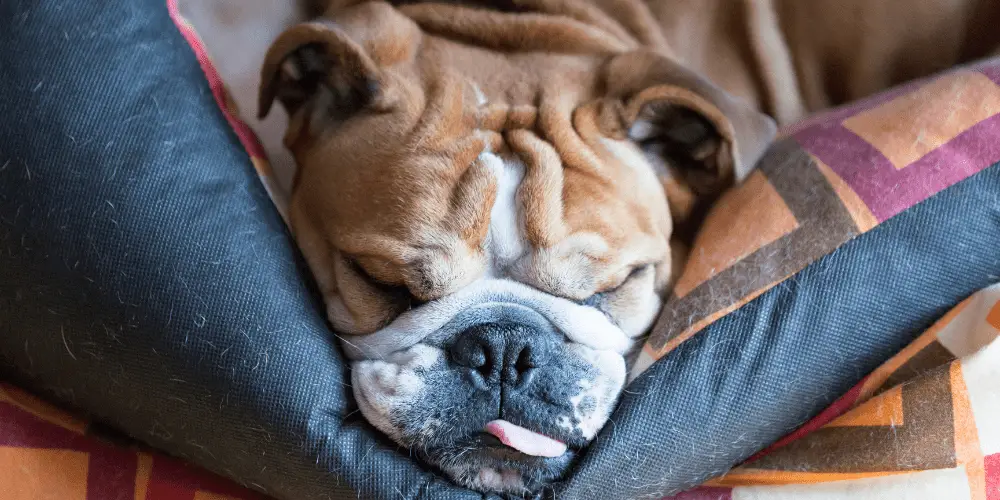It is common to catch your dog’s tongue hanging out at different times of the day, particularly during and after playtime. But what would cause dogs to sleep with their tongues hanging out?
Dogs sleep with their tongue hanging out due to being completely relaxed- a comfortable deep sleep. However, a few health concerns might cause this behavior in particular dogs, like Hanging Tongue Syndrome, dental issues, anxiety, or the effects of certain medications.
Sometimes when you see a dog sound asleep, you know it’s completely out cold because its mouth is open and its tongue has spilled out.
A little sound or a slight nudge can stir the dog; most of the time, it first recomposes its face.
Reasons Why Dogs Sleep with Their tongue hanging Out
1. Hanging Tongue Syndrome
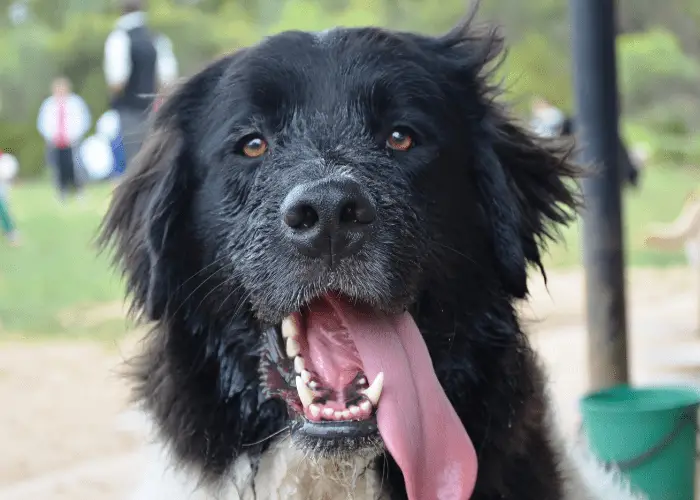
Hanging Tongue Syndrome can occur due to genetic factors or severe injury to the jaw, teeth, or other forms of deformities to the facial area
Some dog breeds, including the Cavalier King Charles Spaniel, Pekingese, and Boxer, are more prone to developing this condition. The tongue may hang out due to a lack of muscle control in the mouth
2. Dental Issues and Missing Teeth
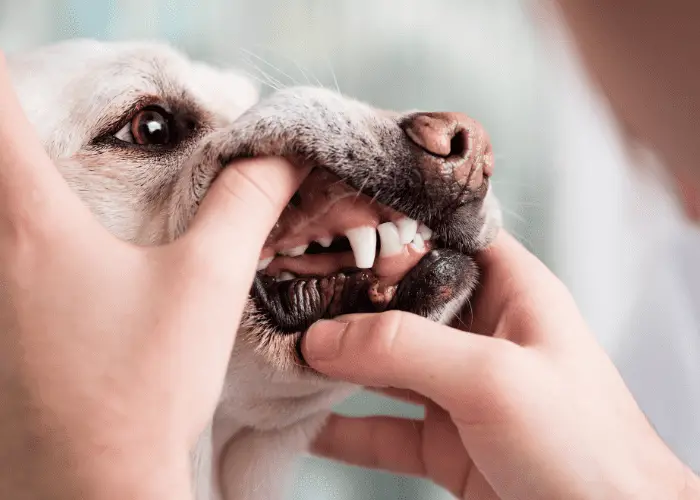
One of the factors that might cause a dog to sleep with its tongue hanging out is dental issues or missing teeth.
Teeth serve as a barrier to the tongue, and when this barrier is compromised, a dog might start sleeping with its tongue out.
Dental pain can also cause this behavior, as the dog may try to move its tongue away from the painful area for relief.
Regular dental check-ups with a veterinarian can help identify and address any dental issues contributing to this behavior.
3. Anxiety or Stress

Stressed or anxious dogs may pant heavily, making their tongue hang out during sleep. If the anxiety or stress is severe enough, the dog may become exhausted and fall asleep with its tongue out to help cool down its body temperature.
4. Medications
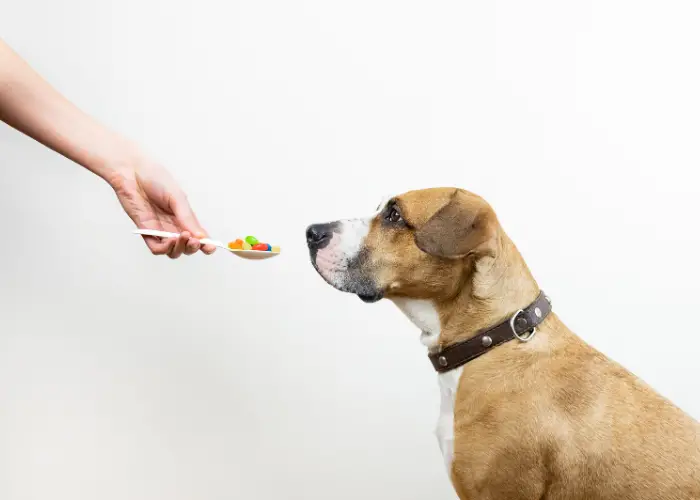
Some medications can cause your dog to suffer side effects that vary. Among them would be the dog sleeping more soundly than it may have in the past, causing it to sleep sluggishly with its tongue hanging out—kind of a medication-induced stupor.
Shape Matters

Some dogs, like the pugs, might have their tongue slip out because the muscles are too relaxed to keep the tongue where it normally is. There are more tongues than their pushed-in skeletal structure can handle when unconscious.
Other dogs live out most of their lives without having this occur due to the overall shape of their skull. The more room within the jaws and the less pushed in the skeletal structure is, the less likely (or less frequently) it will sleep with it all hanging out.
These kinds of sleeping habits are common with many breeds and are a trait that will stick around for the dog’s life.
Dogs Prone to This Sleeping Habit

While this behavior is not exclusive to any breed, certain breeds may be more prone to it due to their unique anatomical features. Let’s examine a few examples of specific dog breeds and how they are affected by this curious sleeping habit:
- Brachycephalic breeds: Dogs with short, flat faces, such as Pugs, Bulldogs, and Shih Tzus, often sleep with their tongues out due to their compressed facial structure. Their small mouths and relaxed muscles during sleep can cause their tongues to slip out more easily.
- Toy breeds: Smaller breeds like Chihuahuas and Pomeranians might be more likely to sleep with their tongues out as their tiny mouths struggle to accommodate their tongues during deep relaxation.
- Breeds with dental issues: Some breeds are predisposed to dental problems, such as Yorkshire Terriers and Dachshunds. When they experience discomfort from missing teeth or dental pain, they might sleep with their tongues out to alleviate the sensation.
- Large breeds with heavy jowls: Breeds like Bloodhounds, Mastiffs, and Saint Bernards have large, droopy jowls that can contribute to their tongues hanging out during sleep. The weight of their jowls may cause the tongue to protrude more frequently when they are in a deep slumber.
What is The Flehmen Response?

The Flehmen Response is more common and widely associated with cats, but dogs also do it. A popular term used synonymously with the Flehmen Response is the simple word “blepping.”
Blepping is when a cat or dog’s tongue sticks out just a little past its face. More often than not, this happens if there is another animal around (or the presence of animal urine) or if the owner has the scent of another animal on their skin or clothing.
Owners typically find it cute, as it appears that the animal is giving them raspberries and gives the cat or dog an overall silly look. However, they haven’t forgotten where their tongue is, and it’s a deliberate action.
Cats and dogs do this as an investigatory measure to use a sense of taste to detect pheromones. Dogs take it further than sticking their tongue out, often raising or curling their upper lip.
Once in a while, you can catch your dog doing this less common than the normal snoozing oddities.
When are Dogs Most Likely to Sleep with Their Tongues Out?
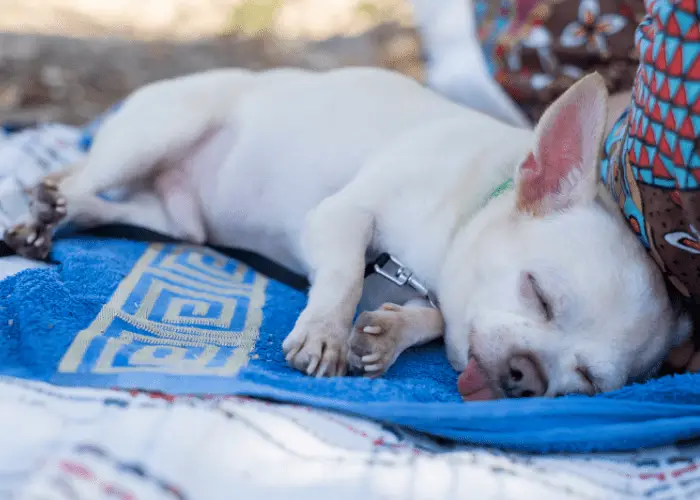
Some breeds don’t sleep with their tongue out all the time. Some things can influence whether or not this happens, the chief of which is warm or hot weather.
Some dogs take the heat like a champ, but most breeds don’t do so well when hot and humid. Even the shorter-haired dogs wear fur coats, while humans can barely stand wearing pants or keeping their shirts on.
Cooling Down the System

Dogs cannot sweat out heat from their systems as we can, and they have no sweat glands outside of those found on their paw pads. The only natural way dogs can expel heat is by panting.
So, dogs are more likely to pant in their sleep when the weather gets warmer, leaving their mouth open and tongue hanging out as it slips back and forth into consciousness. Dehydration might also support this action, so it’s essential to ensure there’s always plenty of water when it gets warm out.
Should I be Worried About My Dog’s Tongue Hanging Out?

Suppose your dog has traditionally slept with its tongue, eventually hanging out during a good sleep. In that case, there’s probably no problem; it is only doing something that comes naturally.
However, if your dog is a few years old and has never done this before while sleeping, it is worthwhile to investigate a little. If the inside temp is the same as it has always been and the dog shows no obvious signs of being sick, a closer examination by a vet should follow.
Final Thoughts

Dogs can do some strange things. Sometimes it’s harmless or even normal; other times, it can signify a problem that should be looked after.
Either way, it is never a bad idea to bring it up to the vet on their next visit or even make an appointment specifically for this issue if this is something that you’re concerned about.
For the most part, it’s just something that dogs do that looks silly when we catch a glimpse of it happening, but it takes place for various good reasons in the world of canines.
Traveling with Dogs? Check Out the article below:
Can Dogs Ride Under Tonneau Covers?
REFERENCES:
1.Owczarczak-Garstecka, S. C., & P. Burman, O. H. (2016). Can Sleep and Resting Behaviours Be Used as Indicators of Welfare in Shelter Dogs (Canis lupus familiaris)? PLoS ONE, 11(10). https://doi.org/10.1371/journal.pone.0163620
2. Kinsman, R., Owczarczak-Garstecka, S., Casey, R., Knowles, T., Tasker, S., Woodward, J., Costa, R. D., & Murray, J. (2020). Sleep Duration and Behaviours: A Descriptive Analysis of a Cohort of Dogs up to 12 Months of Age. Animals: An Open Access Journal from MDPI, 10(7). https://doi.org/10.3390/ani10071172

